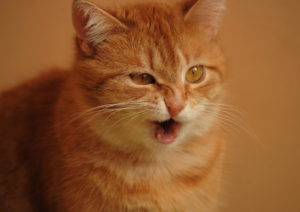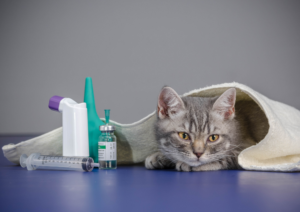Cat flu is the term we use to describe a very common and highly contagious viruses and bacteria which cause feline respiratory disease. Although cats of all ages are at risk, the effects of the disease can be more severe for kittens, older cats, and purebreds. The disease condition is caused by a group of bacterial and viral infections, of which the two most common are the Feline Herpes Virus 1 (FHV1) and Feline Calicivirus (FCV). Here’s some more information about cat flu to help you recognise and prevent the disease.

What are the signs that my cat might have cat flu?
Your kitten may have contracted a cat-flu-causing virus or bacteria before you adopted them. However, the infection can hide in dormancy and go unnoticed. Stress runs down your cat's immune system and allows the virus to take advantage and become active. Therefore, an upheaval such as moving to a new home can bring on a bout of cat flu.
The disease is highly contagious, so your kitty can also easily catch it from infected cats by coming into contact with their eye, nasal, or mouth discharge. The symptoms of cat flu include the following:
- Sneezing
- Discharge from the eyes or nose
- Breathing problems
- Coughing
- Fatigue
- Loss of appetite
- Ulcers on the mouth or eyes
How can I prevent my kitten from contracting cat flu?
The best line of defence against cat flu is to have your kitty vaccinated. Since there are different strains, vaccination may not stop infection from taking place. However, it will lessen the severity of the symptoms. Your kitten can receive a vaccination from around eight weeks old, after which booster vaccinations will be recommended by your vet. Even if your kitten has already had cat flu, it’s a good idea to have them vaccinated since they can become infected again with other strains.
If you have multiple cats and one of them contracts the disease, you will need to isolate the sick pet until they’ve recovered and stopped shedding infectious material, typically around two weeks. Since the disease can be spread through contaminated food or water bowls, litter trays, bedding, and even human hands, you need to wash everything separately and disinfect your hands before touching your other cats.

How is cat flu treated?
Although there’s no cause for stress, it’s best to get your kitten to a vet if you notice they’re not well, especially if they have sore eyes, loss of appetite or trouble breathing. Treatment will vary depending on the cause of the disease, and often only requires good nursing care at home. In the case of secondary bacterial infections, your kitty may receive antibiotics. Other types of medication include anti-viral meds, eye drops as well as pain and fever medication.
The best defence is a good offence - keep your kitties vaccinated, and make sure they have top notch nutrition on board to defend against a bout of ‘flu.



